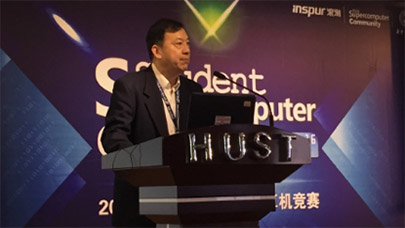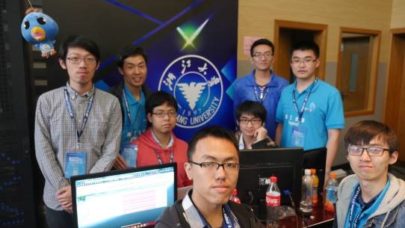
China Sets Ambitious Goal to Reach Exascale by 2020
May 2, 2016
At the 12th HPC Connections Workshop in Wuhan, China, Beihang University Professor Depei Qian disclosed new information regarding HPC development in China and Read more…

ASC16 Student Supercomputer Challenge Results Are In
April 28, 2016
After five days of intense competition in Wuhan, China, the Huazhong University of Science and Technology team was crowned champion of the Asia Supercomputer Community's 2016 Student Supercomputer Challenge (ASC16). The awards ceremony took place last Friday (April 22) on the Huazhong University campus. Read more…

Huazhong University of Science and Technology Crowned the ASC16 Champion
April 22, 2016
ASC Student Supercomputer Challenge 2016 (ASC16) concluded in Wuhan on April 22. The co-host Huazhong University of Science and Technology won the championship Read more…

Zhejiang University Sets New Student Cluster LINPACK Record: 12 Teraflops
April 20, 2016
At 11:30 am local time on Wednesday in Wuhan, China, Zhejiang University was declared the winner of the High Performance LINPACK (HPL) benchmark portion of the Read more…

HPL Record of 12.03TFLOPS Created at ASC16
April 20, 2016
In the first day of HPL contest at the ASC Student Supercomputer Challenge (ASC16) on April 20, the team from Zhejiang University achieved a floating point comp Read more…

ASC16 Finals: The Competition Climax
April 19, 2016
The final round of the ASC Student Supercomputer Challenge 2016 (ASC16) will be held at Huazhong University of Science and Technology in Wuhan from April 18 to Read more…

ASC16 Kicks Off in Wuhan, China: 16 Teams, $40k in Prizes
April 18, 2016
The fifth annual Asia Student Supercomputer Challenge (ASC16) got off to an exciting start this morning at the Huazhong University of Science and Technology (HUST) in Wuhan, the capital of Hubei province, China. Read more…

16 Teams Reach the ASC16 Student Supercomputer Challenge Final
March 18, 2016
On March 18, the ASC Student Supercomputer Challenge 2016 (ASC16) announced the Top 16 finalists. The final round will be held at Huazhong University of Science Read more…

- Click Here for More Headlines

Whitepaper
Transforming Industrial and Automotive Manufacturing
In this era, expansion in digital infrastructure capacity is inevitable. Parallel to this, climate change consciousness is also rising, making sustainability a mandatory part of the organization’s functioning. As computing workloads such as AI and HPC continue to surge, so does the energy consumption, posing environmental woes. IT departments within organizations have a crucial role in combating this challenge. They can significantly drive sustainable practices by influencing newer technologies and process adoption that aid in mitigating the effects of climate change.
While buying more sustainable IT solutions is an option, partnering with IT solutions providers, such and Lenovo and Intel, who are committed to sustainability and aiding customers in executing sustainability strategies is likely to be more impactful.
Learn how Lenovo and Intel, through their partnership, are strongly positioned to address this need with their innovations driving energy efficiency and environmental stewardship.
Download Now
Sponsored by Lenovo
Whitepaper
How Direct Liquid Cooling Improves Data Center Energy Efficiency
Data centers are experiencing increasing power consumption, space constraints and cooling demands due to the unprecedented computing power required by today’s chips and servers. HVAC cooling systems consume approximately 40% of a data center’s electricity. These systems traditionally use air conditioning, air handling and fans to cool the data center facility and IT equipment, ultimately resulting in high energy consumption and high carbon emissions. Data centers are moving to direct liquid cooled (DLC) systems to improve cooling efficiency thus lowering their PUE, operating expenses (OPEX) and carbon footprint.
This paper describes how CoolIT Systems (CoolIT) meets the need for improved energy efficiency in data centers and includes case studies that show how CoolIT’s DLC solutions improve energy efficiency, increase rack density, lower OPEX, and enable sustainability programs. CoolIT is the global market and innovation leader in scalable DLC solutions for the world’s most demanding computing environments. CoolIT’s end-to-end solutions meet the rising demand in cooling and the rising demand for energy efficiency.
Download Now
Sponsored by CoolIT
Advanced Scale Career Development & Workforce Enhancement Center
Featured Advanced Scale Jobs:
HPCwire Resource Library
HPCwire Product Showcase
© 2024 HPCwire. All Rights Reserved. A Tabor Communications Publication
HPCwire is a registered trademark of Tabor Communications, Inc. Use of this site is governed by our Terms of Use and Privacy Policy.
Reproduction in whole or in part in any form or medium without express written permission of Tabor Communications, Inc. is prohibited.
























